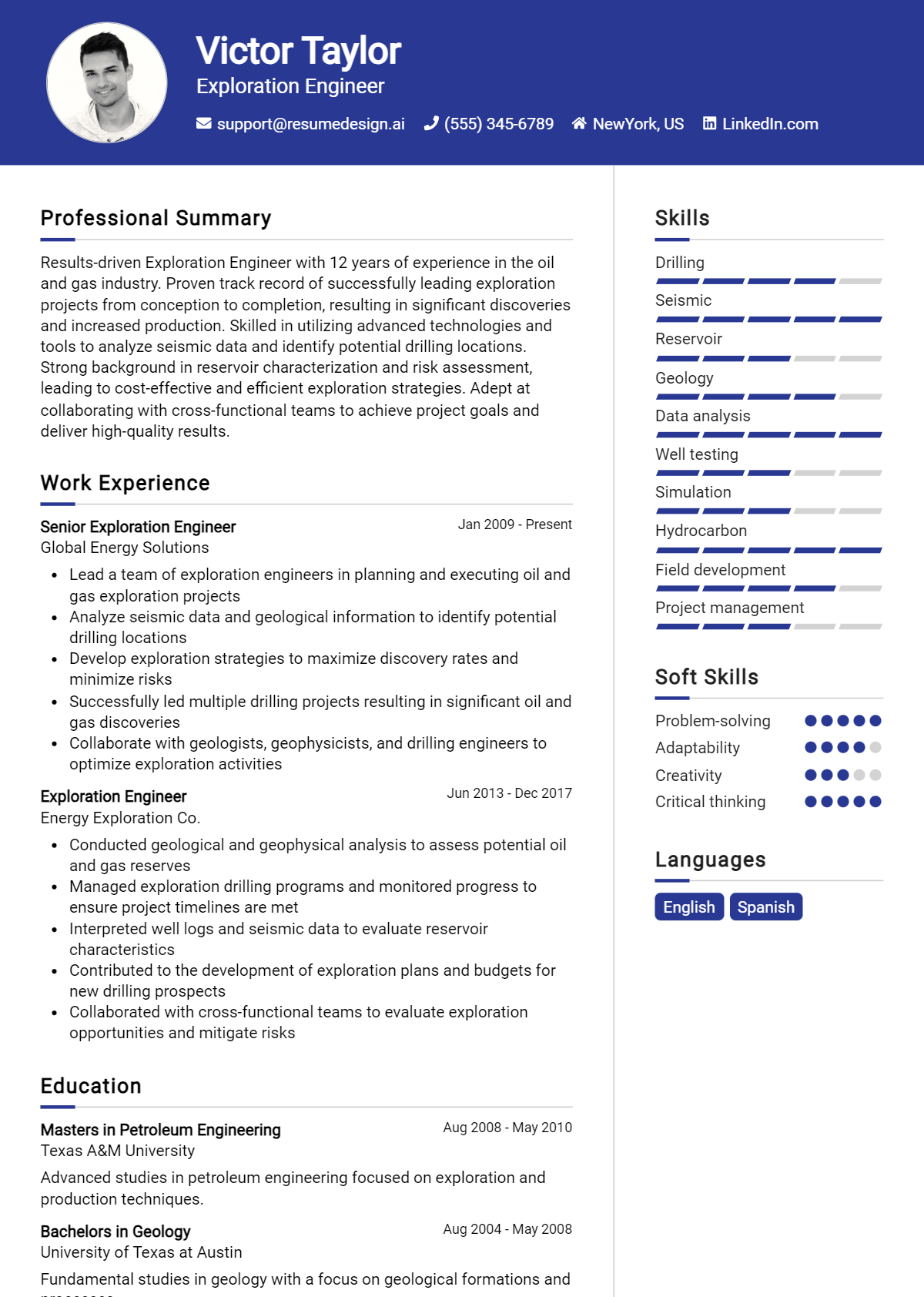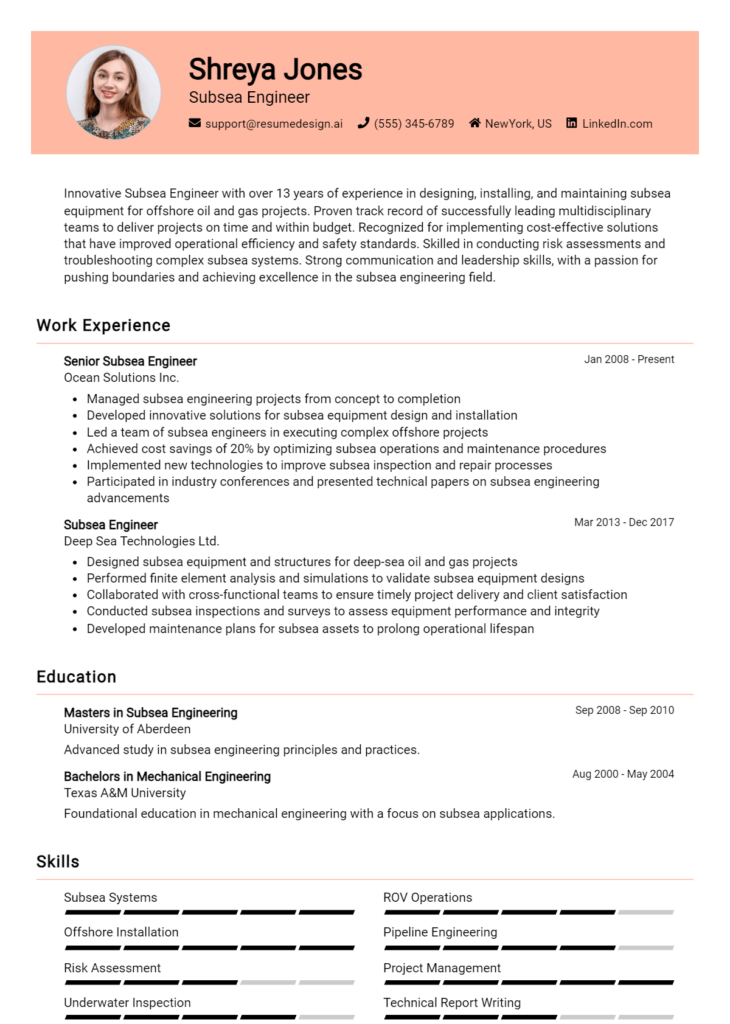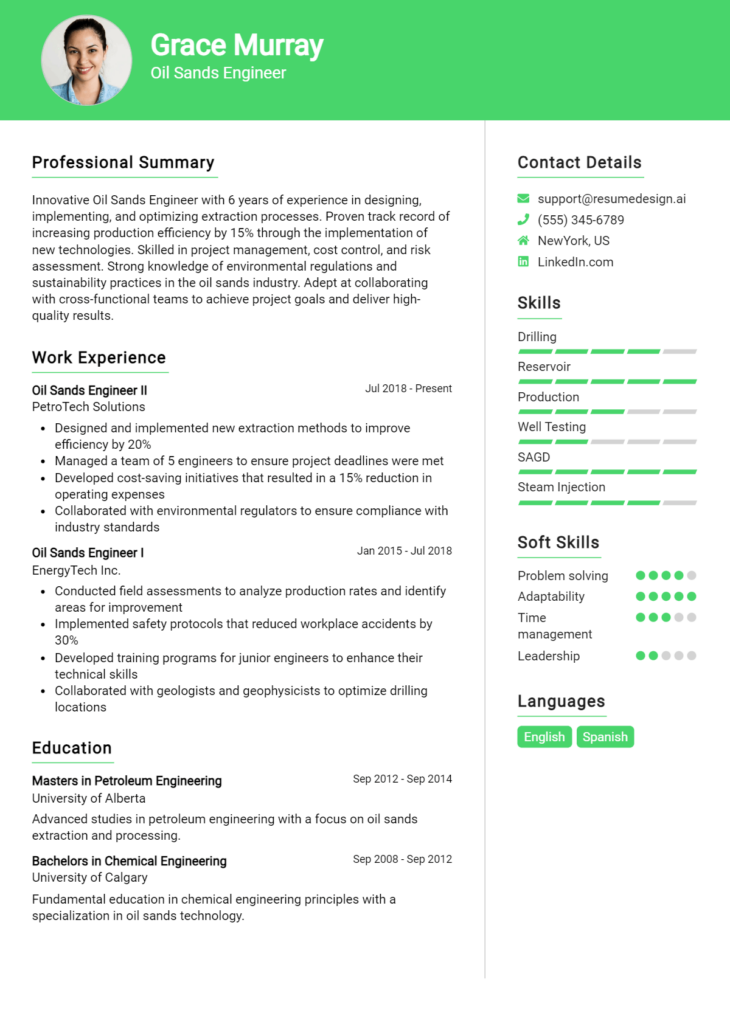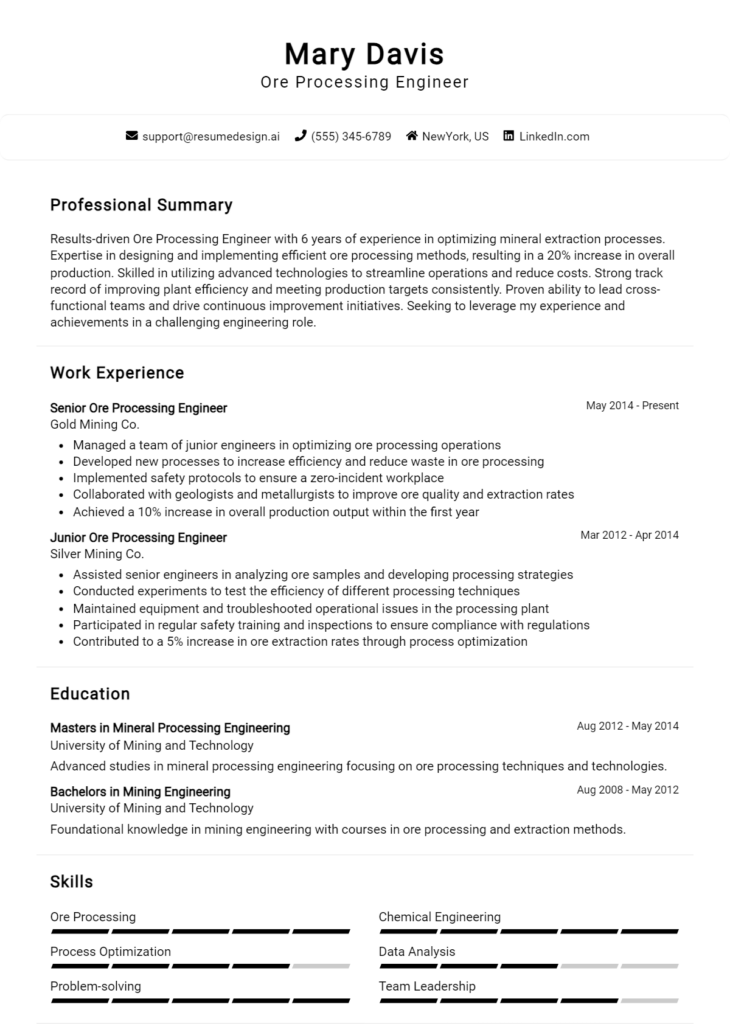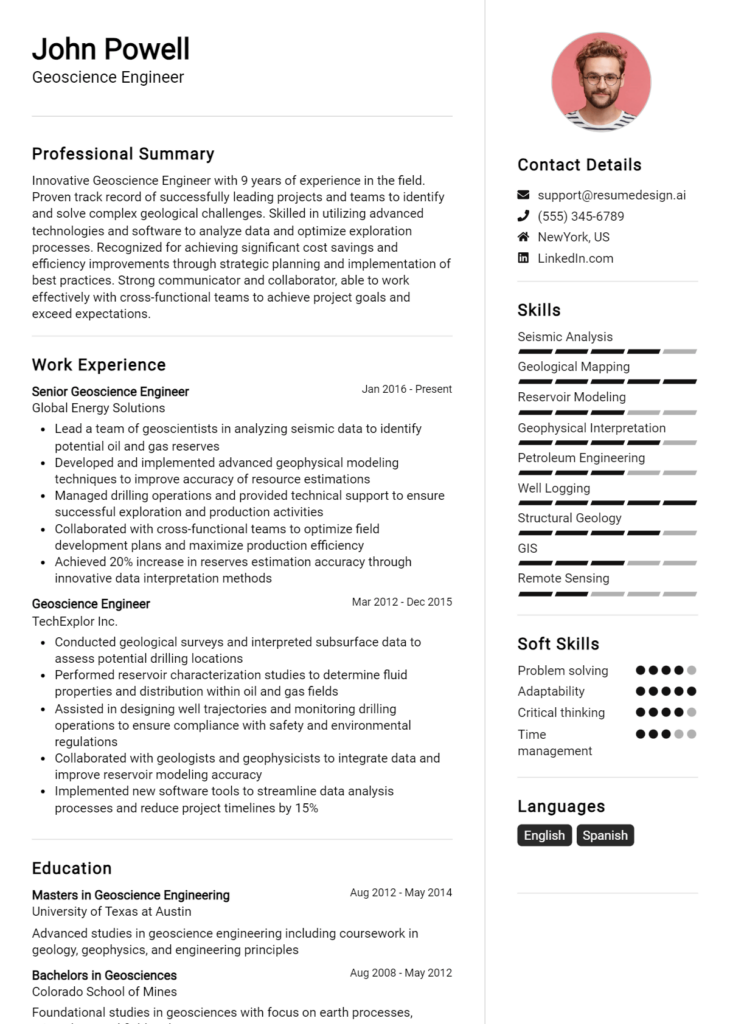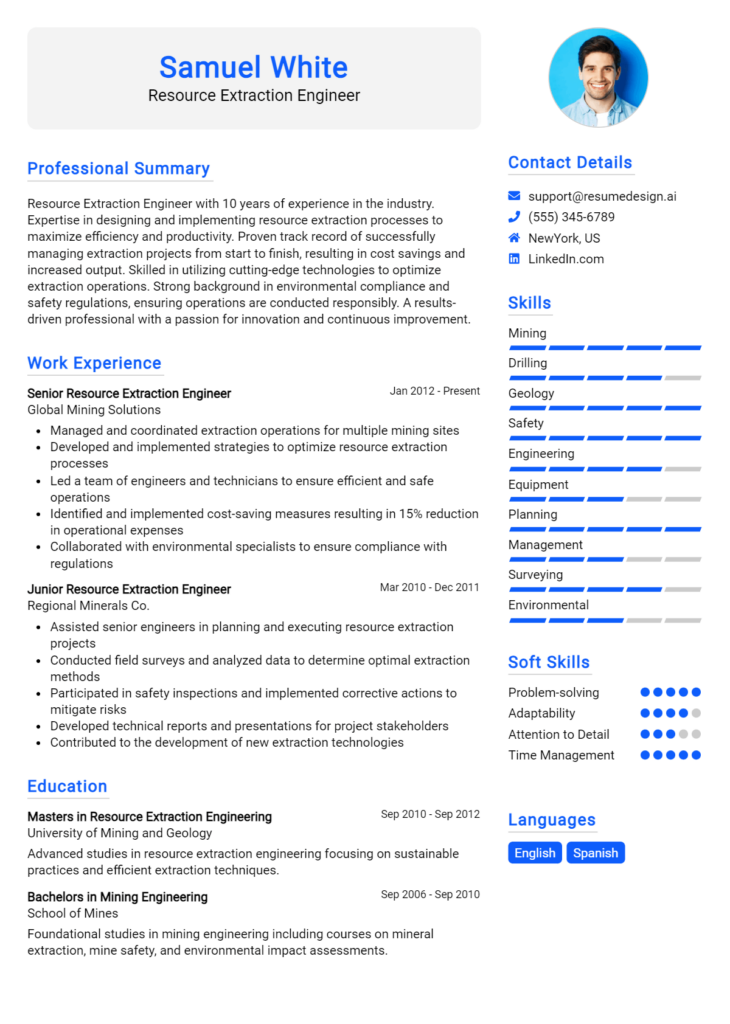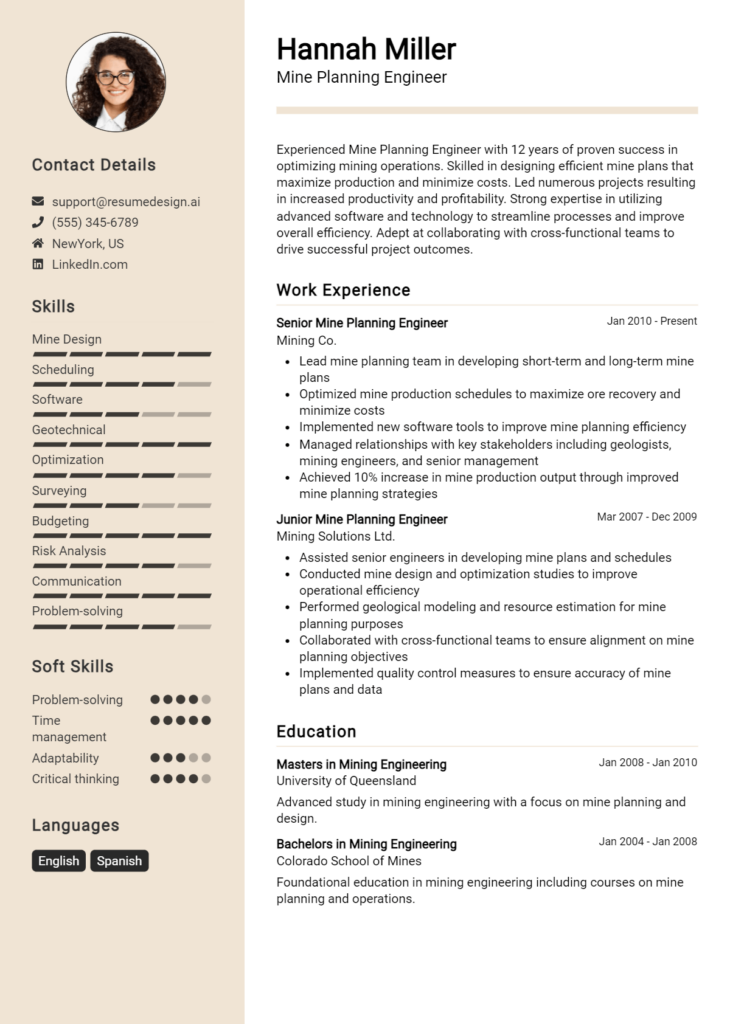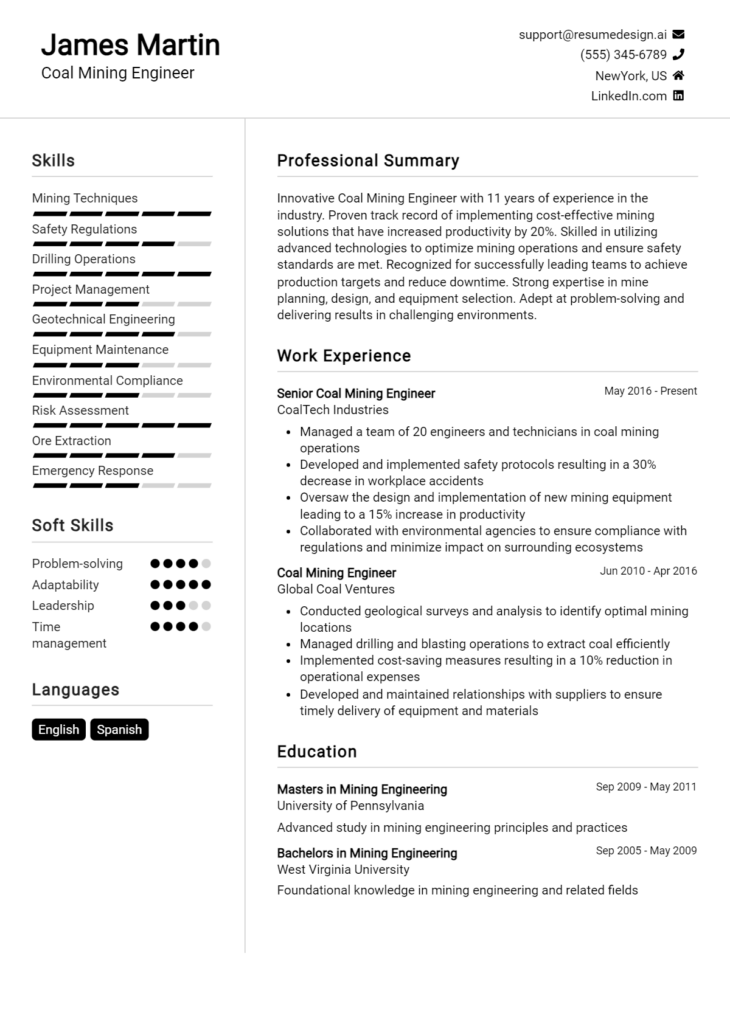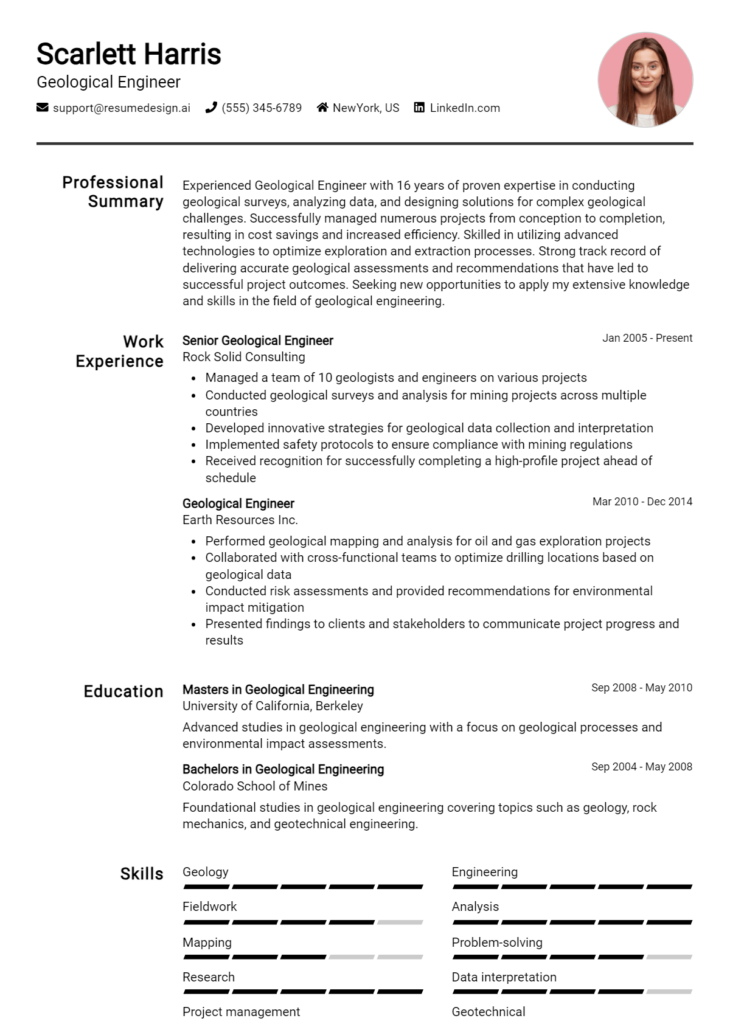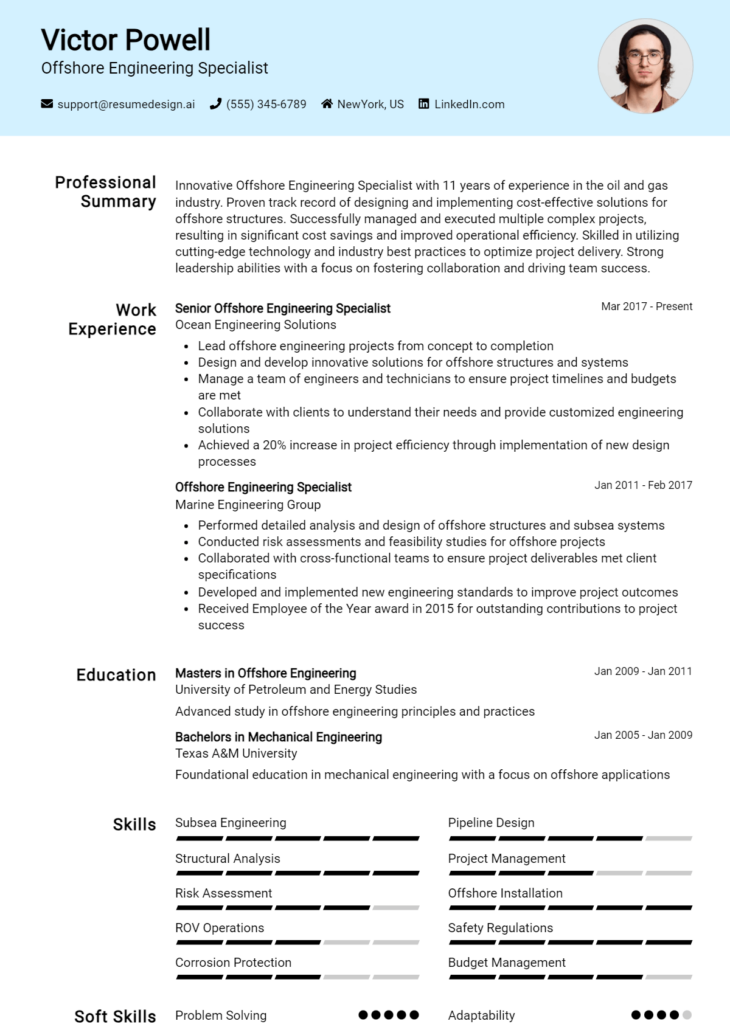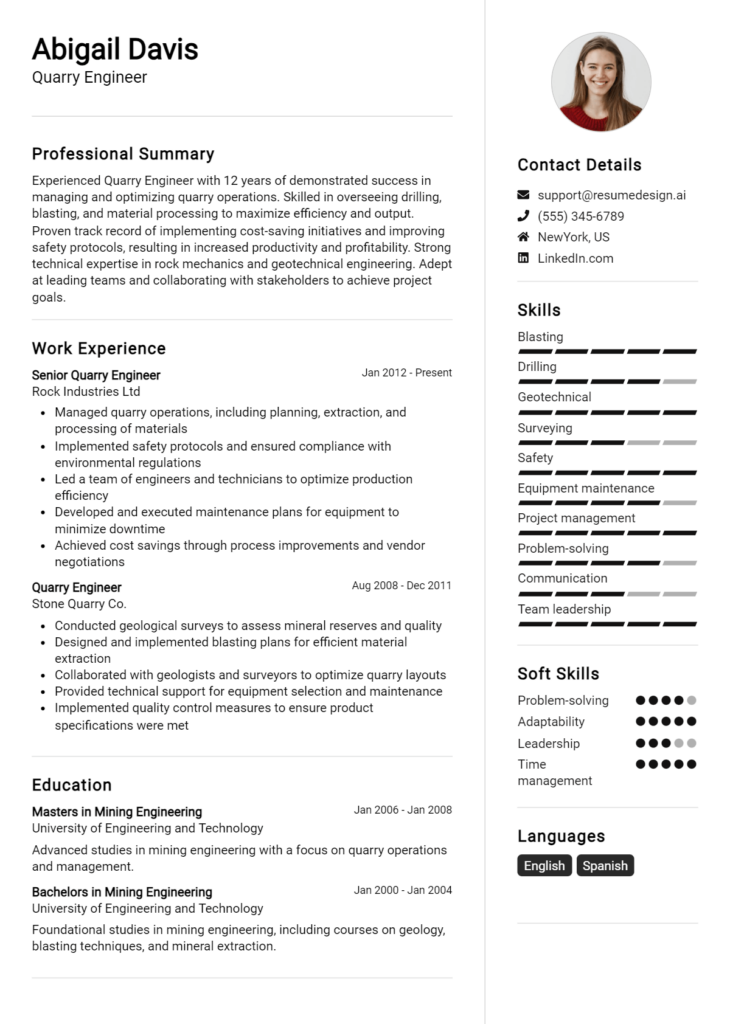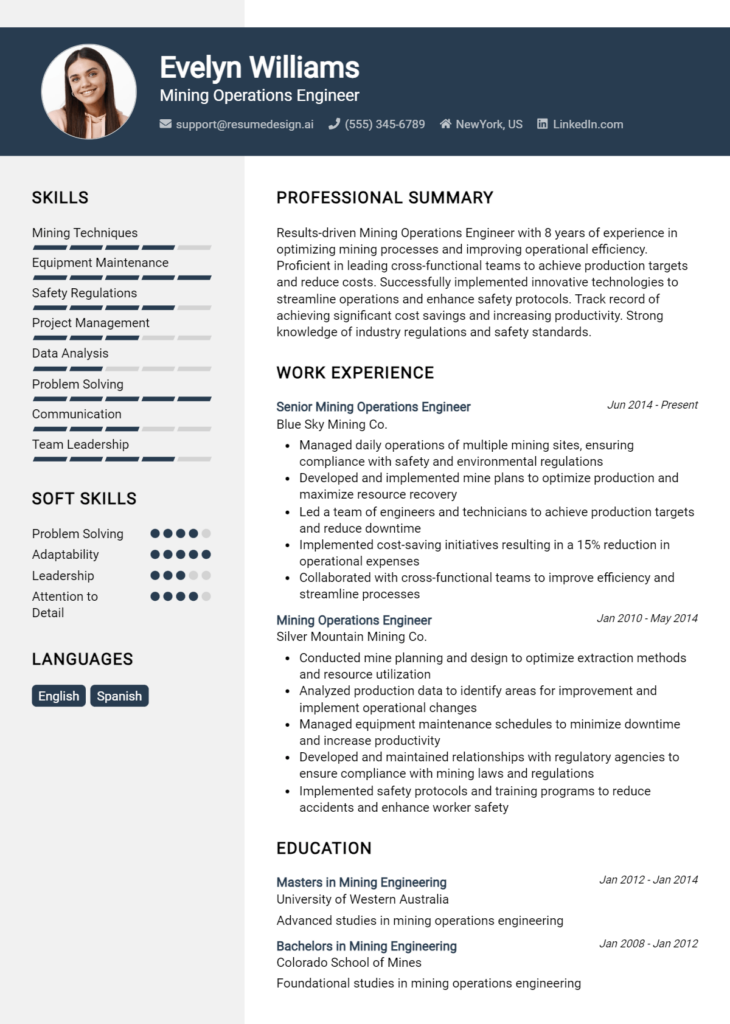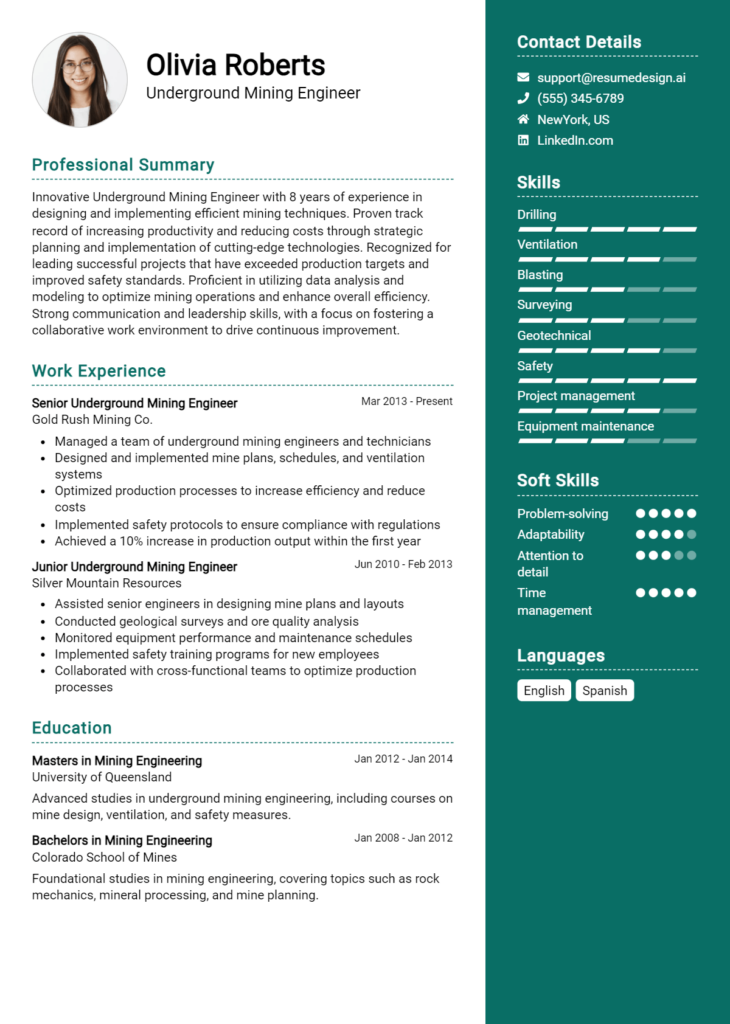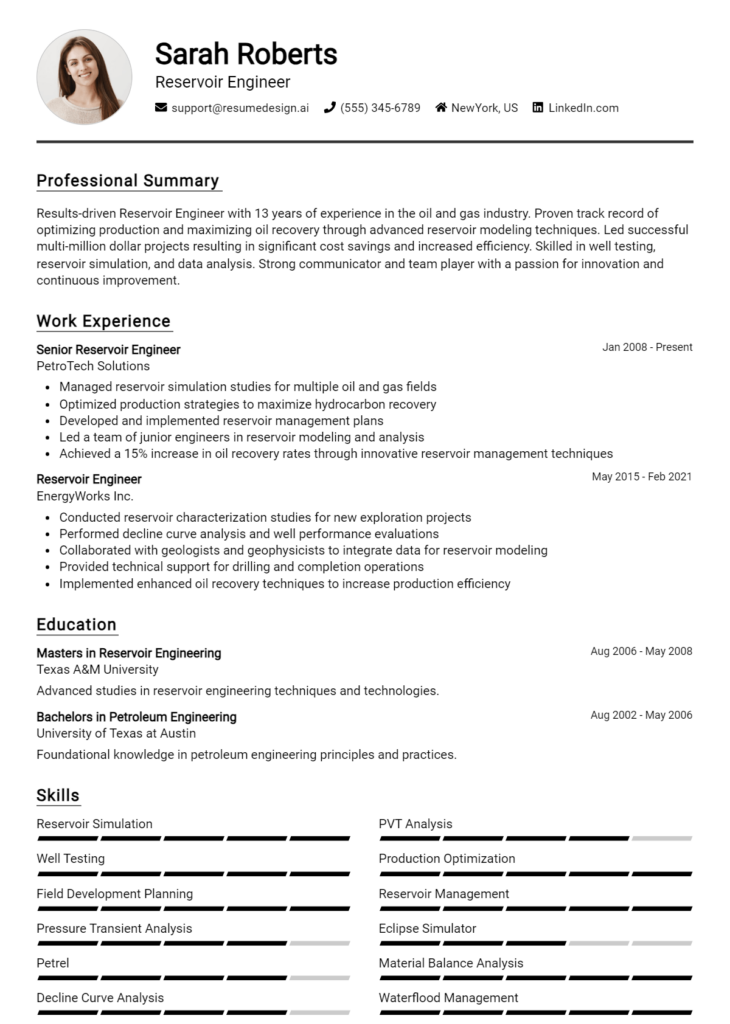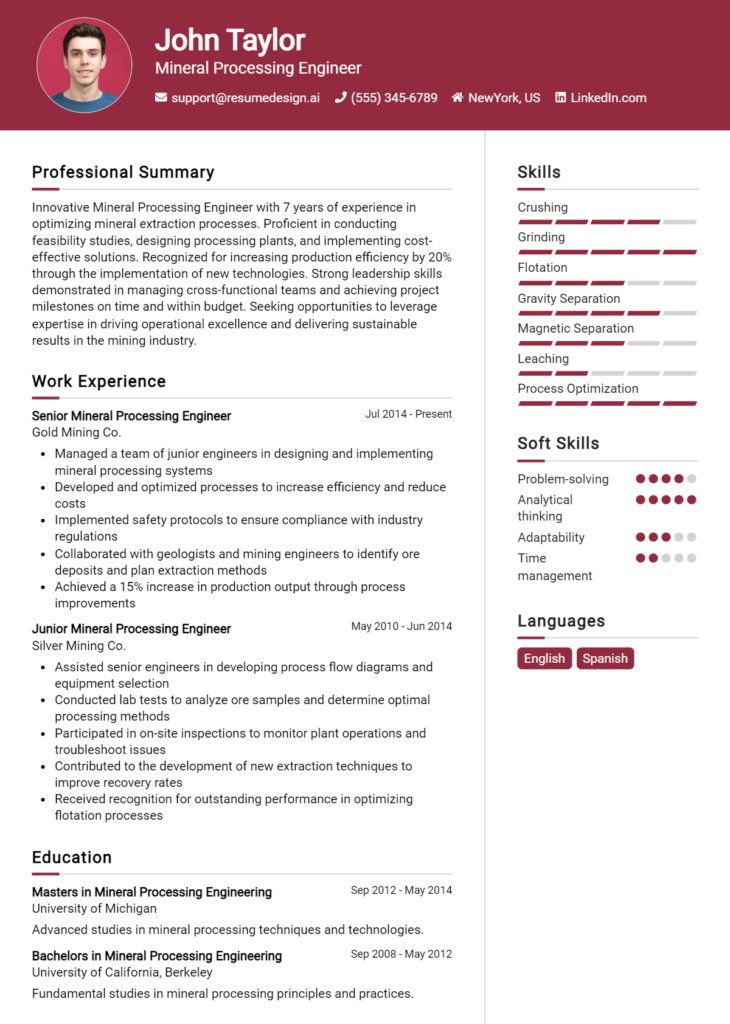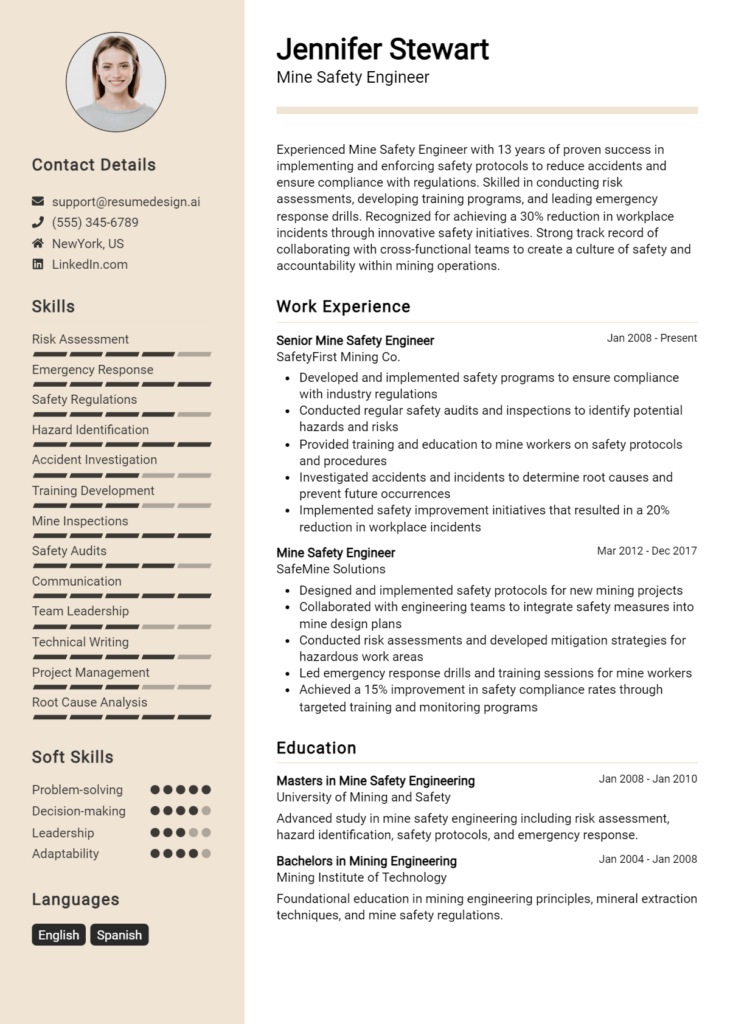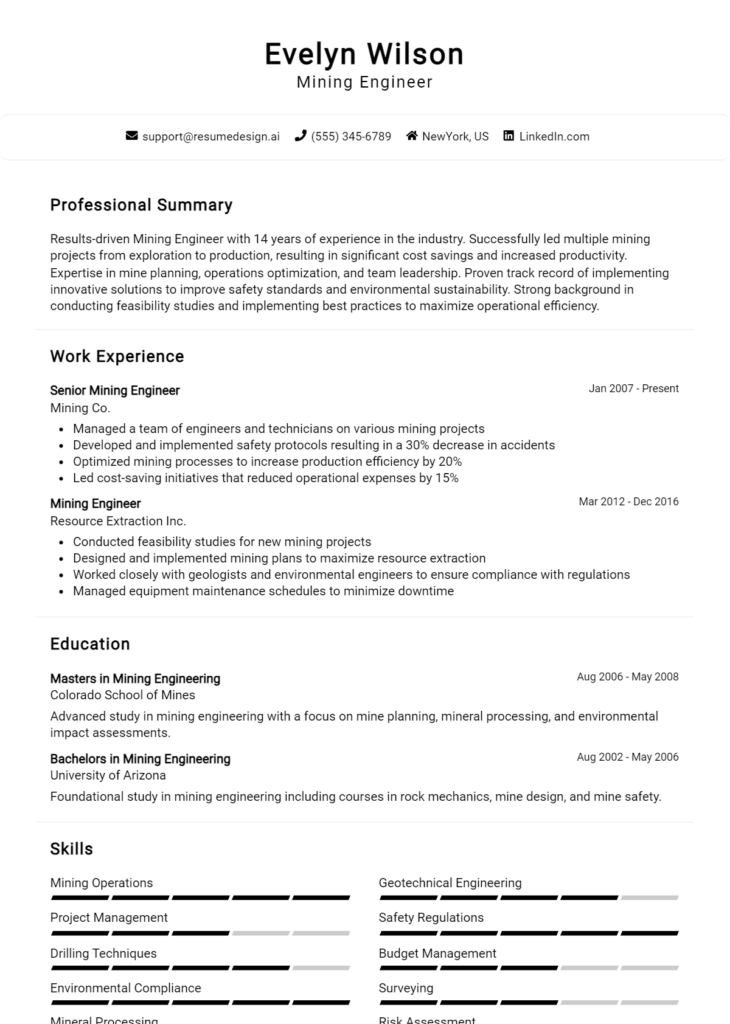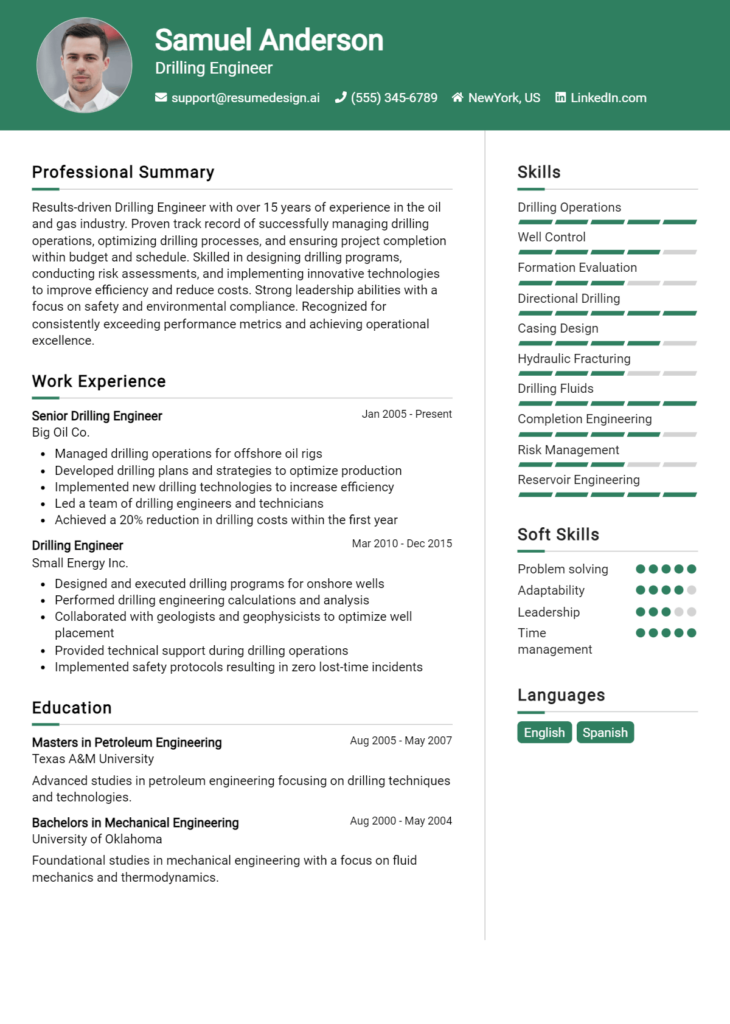Exploration Engineer Core Responsibilities
An Exploration Engineer plays a vital role in the identification and evaluation of potential resources, acting as a bridge between geological research, environmental considerations, and operational execution. Key responsibilities include conducting feasibility studies, analyzing geological data, and collaborating with geologists and project managers. Strong technical knowledge, operational expertise, and problem-solving skills are essential for success. These competencies not only advance project goals but also enhance organizational performance, making a well-structured resume crucial for showcasing these qualifications effectively.
Common Responsibilities Listed on Exploration Engineer Resume
- Conduct geological surveys and studies to identify potential resource deposits.
- Analyze geological data to assess the feasibility of exploration projects.
- Collaborate with cross-functional teams, including geologists and environmental scientists.
- Develop and implement exploration plans and strategies.
- Oversee drilling operations and ensure compliance with safety regulations.
- Prepare technical reports and presentations for stakeholders.
- Monitor and evaluate project progress, adjusting strategies as necessary.
- Utilize advanced software and tools for data modeling and simulation.
- Manage budgets and resources for exploration projects.
- Stay updated on industry trends and advancements in exploration technologies.
High-Level Resume Tips for Exploration Engineer Professionals
A well-crafted resume is crucial for Exploration Engineer professionals, serving as the first impression candidates make on potential employers. In a competitive field where technical expertise and project achievements are paramount, your resume must effectively communicate your skills and accomplishments. It should not only highlight your qualifications but also reflect your unique contributions to past projects and your understanding of industry demands. This guide will provide practical and actionable resume tips specifically tailored for Exploration Engineer professionals, ensuring your resume stands out in a crowded job market.
Top Resume Tips for Exploration Engineer Professionals
- Tailor your resume to match the specific job description, emphasizing the skills and experiences that align with the role.
- Showcase relevant work experience, detailing your responsibilities and contributions in previous exploration projects.
- Quantify your achievements with specific metrics, such as the percentage increase in efficiency or the number of successful projects completed.
- Highlight industry-specific skills like geological modeling, drilling techniques, and reservoir analysis that are critical in the exploration field.
- Use clear and concise language, avoiding jargon that may not be understood by all hiring managers.
- Incorporate keywords from the job posting to help your resume get past Applicant Tracking Systems (ATS).
- Include certifications and relevant training that demonstrate your commitment to professional development in the exploration sector.
- Make sure your resume is visually appealing, with a clean layout that allows for easy reading and navigation.
- Consider adding a summary statement at the top of your resume to encapsulate your expertise and career goals.
By implementing these tips, you can significantly enhance your resume's effectiveness and increase your chances of landing a job in the Exploration Engineer field. A well-structured and tailored resume not only showcases your qualifications but also demonstrates your understanding of the industry's demands, making you a more attractive candidate to potential employers.
Why Resume Headlines & Titles are Important for Exploration Engineer
In the competitive field of exploration engineering, a well-crafted resume headline or title serves as a pivotal first impression for hiring managers. A strong headline can immediately capture attention, succinctly summarizing a candidate's key qualifications and expertise in an impactful phrase. This concise and relevant summary should directly relate to the job being applied for, enabling hiring managers to quickly recognize a candidate's alignment with the role. In a field where technical skills and experience are paramount, a compelling headline can set a candidate apart, making it an essential component of a successful resume.
Best Practices for Crafting Resume Headlines for Exploration Engineer
- Keep it concise: Aim for a headline that is brief yet informative, ideally no more than 10 words.
- Be role-specific: Tailor the headline to the exploration engineering field, using relevant terminology.
- Highlight key qualifications: Focus on core competencies or achievements that demonstrate your value.
- Use action verbs: Start with dynamic verbs that convey your expertise and proactive approach.
- Include industry keywords: Incorporate specific keywords from the job description to pass through applicant tracking systems.
- Demonstrate results: If possible, quantify achievements to showcase your effectiveness in previous roles.
- Stay professional: Use a formal tone suitable for the engineering industry, avoiding casual phrases.
- Review and revise: Continuously improve your headline based on feedback and the evolving job market.
Example Resume Headlines for Exploration Engineer
Strong Resume Headlines
"Results-Driven Exploration Engineer with 8+ Years in Resource Development"
“Innovative Geophysicist Specializing in Advanced Subsurface Imaging Techniques”
“Expert in Drilling Optimization and Reservoir Analysis for Oil and Gas Projects”
Weak Resume Headlines
“Engineer Looking for Job”
“Exploration Engineer with Experience”
The strong headlines are effective because they clearly convey specific strengths, skills, and experiences that align with the role of an exploration engineer. They use precise language and quantifiable achievements, making it easy for hiring managers to see the candidate's value at a glance. In contrast, the weak headlines fail to make an impact due to their vague nature and lack of detail. They do not provide any insight into the candidate's qualifications or how they can contribute to the organization, ultimately diminishing their chances of standing out in a competitive job market.
Writing an Exceptional Exploration Engineer Resume Summary
In the competitive field of exploration engineering, a well-crafted resume summary is crucial for making a strong first impression. This summary serves as a concise introduction to your qualifications, highlighting the key skills, experiences, and accomplishments that are directly relevant to the position. A strong resume summary quickly captures the attention of hiring managers, allowing them to see at a glance how you can contribute to their team. By being impactful and tailored to the specific job application, you increase your chances of standing out among other candidates and securing an interview.
Best Practices for Writing a Exploration Engineer Resume Summary
- Quantify your achievements: Use specific numbers and metrics to demonstrate your impact and success in previous roles.
- Focus on relevant skills: Highlight the technical and soft skills that are directly applicable to exploration engineering.
- Tailor for the job description: Customize your summary to align with the specific requirements and responsibilities outlined in the job posting.
- Be concise: Aim for 3-5 sentences that succinctly convey your value without unnecessary jargon.
- Use action verbs: Start sentences with strong verbs to convey your accomplishments and contributions effectively.
- Showcase industry knowledge: Mention any relevant technologies, methods, or regulations that demonstrate your expertise in exploration engineering.
- Highlight certifications: If applicable, include any relevant certifications or licenses that enhance your qualifications.
- Convey passion for the role: Briefly express your enthusiasm for exploration engineering to connect with potential employers on a personal level.
Example Exploration Engineer Resume Summaries
Strong Resume Summaries
Results-driven Exploration Engineer with over 7 years of experience in resource identification and assessment, successfully managing projects that resulted in a 30% increase in mineral yield. Proficient in utilizing advanced geological modeling software and leading cross-functional teams to achieve project milestones.
Detail-oriented Exploration Engineer with expertise in seismic data interpretation and well log analysis. Spearheaded a team project that reduced drilling costs by 15% through innovative techniques and improved planning processes, ensuring project delivery ahead of schedule.
Dynamic Exploration Engineer with a track record of conducting successful feasibility studies that led to the discovery of new reserves, contributing to a 25% growth in company revenue. Skilled in stakeholder engagement and adept at navigating regulatory requirements to ensure compliance.
Weak Resume Summaries
Experienced engineer looking for opportunities in exploration. I have worked in various roles and am familiar with the industry.
Motivated professional with a background in engineering, seeking to leverage skills in exploration. I am eager to learn and grow in a new role.
The strong resume summaries are effective because they provide specific examples of achievements, quantify results, and highlight relevant skills that align with the exploration engineering role. In contrast, the weak summaries lack detail and specificity, making them too generic and unmemorable for hiring managers. By illustrating clear accomplishments and technical proficiencies, the strong summaries create a compelling case for the candidate's potential contributions to the employer's team.
Work Experience Section for Exploration Engineer Resume
The work experience section of an Exploration Engineer resume is critical as it serves as a comprehensive showcase of the candidate's technical skills, leadership capabilities, and commitment to delivering high-quality results. This section not only highlights specific projects and accomplishments but also demonstrates the ability to manage teams and collaborate effectively within multidisciplinary environments. By quantifying achievements and aligning experiences with industry standards, candidates can effectively present their qualifications and stand out to potential employers seeking skilled professionals in the exploration engineering field.
Best Practices for Exploration Engineer Work Experience
- Highlight relevant technical skills and tools used in previous roles.
- Quantify achievements with specific metrics (e.g., cost savings, efficiency improvements).
- Detail leadership roles and team management experiences.
- Use action verbs to convey proactivity and responsibility.
- Align experiences with current industry trends and technologies.
- Include collaborative projects that demonstrate teamwork and communication skills.
- Focus on problem-solving scenarios and how they were addressed.
- Tailor each experience to the specific job you are applying for.
Example Work Experiences for Exploration Engineer
Strong Experiences
- Led a cross-functional team in the successful assessment of three oil exploration sites, resulting in a 25% increase in resource identification accuracy.
- Implemented a new geological modeling software that reduced project completion time by 30%, improving overall operational efficiency.
- Managed a $2 million drilling project, ensuring completion ahead of schedule and under budget while adhering to safety and environmental regulations.
- Collaborated with environmental engineers to develop and execute a sustainable exploration plan that decreased environmental impact by 40%.
Weak Experiences
- Worked on various exploration projects.
- Assisted in team meetings and discussions.
- Took part in data analysis tasks.
- Involved in project planning activities.
The examples of strong experiences are considered effective because they provide specific, quantifiable outcomes and clearly demonstrate the candidate's technical leadership and collaborative efforts. In contrast, the weak experiences lack detail and fail to convey the candidate's impact or contributions, making them less compelling to potential employers.
Education and Certifications Section for Exploration Engineer Resume
The education and certifications section of an Exploration Engineer resume plays a crucial role in showcasing the candidate's academic background and professional qualifications. This section reflects not only the foundational knowledge gained through education but also highlights industry-relevant certifications and ongoing learning efforts that are essential in a constantly evolving field. Including relevant coursework, specialized training, and recognized certifications enhances the candidate's credibility, demonstrating a commitment to maintaining expertise and aligning closely with the specific demands of the job role. A well-structured education and certifications section can significantly improve a candidate's chances of standing out in a competitive job market.
Best Practices for Exploration Engineer Education and Certifications
- Focus on relevant degrees and certifications that align with the exploration engineering field.
- Include GPA if it is impressive (typically 3.0 or above) to highlight academic performance.
- List specialized training programs or workshops that pertain to current technologies or methodologies in exploration.
- Highlight any industry-recognized certifications such as the Society of Petroleum Engineers (SPE) certification.
- Provide brief descriptions for less common certifications or degrees to clarify their relevance.
- Keep the section concise and organized, using bullet points for clarity and easy reading.
- Update this section regularly to reflect new qualifications or ongoing education efforts.
- Consider including relevant professional development courses that demonstrate continuous learning.
Example Education and Certifications for Exploration Engineer
Strong Examples
- Bachelor of Science in Petroleum Engineering, University of Texas, 2020
- Master of Science in Geology, Stanford University, 2022
- Certified Petroleum Engineer (CPE) from the Society of Petroleum Engineers, 2021
- Advanced Exploration Techniques Course, American Association of Petroleum Geologists, 2023
Weak Examples
- Bachelor of Arts in History, University of California, 2018
- Certification in Basic Computer Skills, Online Course, 2019
- High School Diploma, Anytown High School, 2016
- Outdated certification in Oil and Gas Safety, 2015
The strong examples are considered effective as they directly relate to the field of exploration engineering, showcasing relevant degrees and recognized certifications that demonstrate the candidate's expertise and commitment to the profession. In contrast, the weak examples reflect qualifications that are either irrelevant to the role or lack industry recognition, which can detract from the candidate's overall credibility and alignment with the job requirements.
Top Skills & Keywords for Exploration Engineer Resume
As an Exploration Engineer, possessing the right skills is paramount to your success in this dynamic field. Your resume should not only highlight your technical expertise but also showcase your interpersonal abilities, as both hard and soft skills are critical in navigating the complexities of exploration projects. A well-structured resume that emphasizes these skills can set you apart from the competition and demonstrate your capability to effectively contribute to your team and organization. Focusing on relevant skills in your resume can also make it easier for hiring managers and applicant tracking systems to recognize your qualifications, increasing your chances of landing an interview.
Top Hard & Soft Skills for Exploration Engineer
Soft Skills
- Problem-solving
- Communication
- Teamwork
- Adaptability
- Critical thinking
- Time management
- Leadership
- Attention to detail
- Creativity
- Conflict resolution
- Decision-making
- Interpersonal skills
- Negotiation
- Emotional intelligence
- Project management
- Resilience
Hard Skills
- Geophysical data analysis
- Geological mapping
- Reservoir engineering
- Drilling engineering
- Software proficiency (e.g., Petrel, ArcGIS)
- Data interpretation
- Risk assessment
- Environmental regulations compliance
- Hydrocarbon exploration techniques
- Project feasibility studies
- Technical report writing
- Resource evaluation
- CAD software expertise
- Well logging techniques
- Statistical analysis
- Groundwater modeling
- Petroleum engineering principles
For more detailed insights into crafting your resume, including how to effectively present your skills and work experience, consider exploring additional resources to enhance your application.
Stand Out with a Winning Exploration Engineer Cover Letter
Dear [Hiring Manager's Name],
I am writing to express my interest in the Exploration Engineer position at [Company Name], as advertised on [Where You Found the Job Posting]. With a solid foundation in geological engineering and over [X years] of experience in mineral exploration, I am excited about the opportunity to contribute to your team. My hands-on experience in conducting subsurface analyses, coupled with my commitment to sustainability and innovation, aligns well with [Company Name]'s vision for responsible resource development.
In my previous role at [Previous Company Name], I successfully led a multidisciplinary team in a major exploration project that resulted in a [specific achievement, e.g., a significant increase in resource estimates or the discovery of a new deposit]. My expertise in utilizing advanced geophysical and geochemical methods has enabled me to identify and assess potential resource deposits effectively. I am adept at integrating modern software tools, such as GIS and reservoir simulation software, to enhance exploration accuracy and efficiency. Moreover, my strong analytical skills and attention to detail ensure that I consistently deliver high-quality results under tight deadlines.
I am particularly drawn to [Company Name] because of its commitment to innovation and excellence in exploration. I admire your recent initiatives in [mention any specific project or value related to the company], and I am eager to bring my proactive approach to problem-solving and my passion for exploration to your esteemed organization. I am confident that my technical expertise and collaborative spirit will make a positive impact on your projects and contribute to your continued success.
Thank you for considering my application. I look forward to the opportunity to discuss how my background, skills, and enthusiasms align with the needs of your team. I am excited about the possibility of contributing to [Company Name] and am eager to bring my knowledge of exploration engineering to drive impactful results.
Sincerely,
[Your Name]
[Your Phone Number]
[Your Email Address]
Common Mistakes to Avoid in a Exploration Engineer Resume
When crafting a resume for the position of an Exploration Engineer, it's crucial to avoid common pitfalls that can undermine your chances of standing out to potential employers. A well-structured and tailored resume can significantly impact your job search, while mistakes can lead to your application being overlooked. Below are some typical errors that candidates often make when applying for this specialized role:
Generic Objective Statement: Starting with a vague objective statement that doesn't specifically relate to the Exploration Engineer role can make your resume blend in with others. Tailor your objective to reflect your career goals and the value you bring to the position.
Overloading with Technical Jargon: While technical skills are essential, using excessive jargon can alienate hiring managers who may not be specialists in your field. Strike a balance by clearly explaining your skills and experiences without overwhelming the reader.
Ignoring Relevant Experience: Many candidates fail to highlight relevant experience, focusing instead on unrelated jobs. Ensure your resume emphasizes your exploration and engineering-related experiences, particularly those that demonstrate your problem-solving and analytical skills.
Lack of Quantifiable Achievements: Simply listing responsibilities without quantifying achievements can weaken your resume. Use metrics and specific examples to illustrate how your contributions led to successful outcomes in previous roles.
Inconsistent Formatting: A cluttered or inconsistent format can distract from your qualifications. Maintain a clean, professional layout with uniform font sizes and styles to enhance readability.
Neglecting Soft Skills: Exploration Engineers need strong communication and teamwork skills. Failing to incorporate soft skills can create an incomplete picture of your abilities. Highlight instances where you collaborated effectively or led teams.
Omitting Continuous Learning: The field of exploration engineering is ever-evolving. Not mentioning any ongoing education, certifications, or professional development can suggest a lack of commitment to staying current in the field.
Typos and Grammatical Errors: Simple mistakes can convey a lack of attention to detail. Always proofread your resume multiple times to ensure it's polished and free from errors, as this reflects your professionalism and diligence.
Conclusion
As an Exploration Engineer, your role is crucial in the identification and evaluation of potential resources, whether they be minerals, oil, or natural gas. This article has highlighted several essential skills and qualifications necessary for excelling in this field, including:
- Technical Proficiency: A solid understanding of geological principles, geophysical methods, and drilling technologies is vital.
- Analytical Skills: Ability to interpret data and make informed decisions based on geological surveys and exploration models.
- Project Management: Experience in overseeing exploration projects and collaborating with multidisciplinary teams is essential for success.
- Safety and Environmental Awareness: Knowledge of regulatory frameworks and best practices to ensure safe and environmentally responsible exploration activities.
In conclusion, the demand for skilled Exploration Engineers continues to grow, making it imperative to present your qualifications effectively. Now is the perfect time to review and enhance your Exploration Engineer resume to align with industry standards and showcase your expertise.
Utilize available resources to refine your professional presentation. Check out the resume templates to find a design that suits your style, or try the resume builder for a guided approach to creating your resume. You can also draw inspiration from resume examples tailored for Exploration Engineers. Don’t forget to complement your resume with a strong introduction through cover letter templates.
Take action today and elevate your career prospects in the exploration engineering field!

